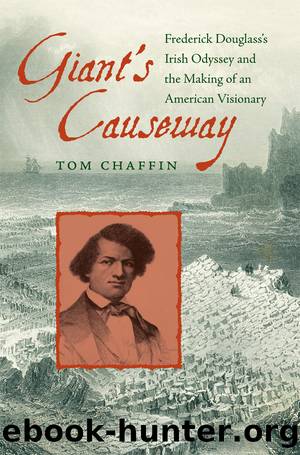Giant's Causeway by Tom Chaffin

Author:Tom Chaffin [Chaffin, Tom]
Language: eng
Format: epub
Tags: History, United States, 19th Century
ISBN: 9780813936116
Google: 4nCdAwAAQBAJ
Publisher: University of Virginia Press
Published: 2014-12-15T00:25:17+00:00
CHAPTER 18
âMr. Editor, If You Pleaseâ
BY OPERATING his own paper, Douglass could keep his words from being subject to the vagaries of other writers, editors, and publishers. Like other abolitionist papers, the North Star offered modest editorial fareâfour pages, each with six columns. Also like other antislavery papers, it ran reports on the activities of abolitionist societies, texts of speeches by antislavery members of Congress, as well as presidential addresses. And, typical of other papers of that eraâabolitionist and generalâthe North Star routinely reprinted materials from other publications.1
During that period, however, Douglass did not entirely forsake lecturing. Through the late 1840s, he continued a reduced but still demanding calendar of lecture dates and conferences. Notably, in July 1848, he joined Elizabeth Cady Stanton, Lucretia Mott, William Lloyd Garrison, and other reformers for a two-day convention in Seneca Falls, New York, devoted to womenâs rights, or, as contemporaries called it, âwomanâs rights.â
The meeting reinforced Douglassâs commitment to the cause of womenâs rights. Indeed, in the course of his lifeâbeyond those activists who attended the Seneca Falls meetingâhe also worked closely with Angela Grimké, Lydia Maria Child, Susan B. Anthony, Harriet Beecher Stowe, and other womenâs rights advocates. Of his involvement in that cause, he later wrote:
Observing womanâs agency, devotion, and efficiency in pleading the cause of the slave, gratitude for this high service early moved me to give favorable attention to the subject of what is called âwomanâs rightsâ and caused me to be denominated a womanâs-rights man. I am glad to say that I have never been ashamed to be thus designated. Recognizing not sex nor physical strength, but moral intelligence and the ability to discern right from wrong, good from evil, and the power to choose between them, as the true basis of republican government, to which all are alike subject and all bound alike to obey, I was not long in reaching the conclusion that there was no foundation in reason or justice for womanâs exclusion from the right of choice in the selection of the persons who should frame the laws, and thus shape the destiny of all the people, irrespective of sex.2
Weeks after the Seneca Falls meeting, Douglass attended, on August 9 and 10, the founding convention of the Free Soil Party, in Buffalo, New York. The gathering nominated former president Martin Van Buren as the new partyâs candidate for that yearâs presidential race. Twenty thousand people attended the conventionâabolitionists as well as those seeking merely to ban slavery in the newly acquired U.S. territories in the West and to preserve those domains for exclusive use by white settlers. For the meetingâs attendees, their numbers swelled by rail fares reduced for the occasion, it offered a dazzling array of speakers and performers, including, besides Douglass, Charles Lenox Remond, Samuel Ringgold Ward, Henry Bibb, Henry Highland Garnet, and the Hutchinson Family Singers. The journalist, and later poet, Walt Whitman attended the gathering; and later remembered Douglassâs oratorical prowess before it: âHe has a splendid voice, loud, clear and sonorous, which would make itself heard in the largest open air assembly.
Download
This site does not store any files on its server. We only index and link to content provided by other sites. Please contact the content providers to delete copyright contents if any and email us, we'll remove relevant links or contents immediately.
| United States | Abolition |
| Campaigns & Battlefields | Confederacy |
| Naval Operations | Regimental Histories |
| Women |
In Cold Blood by Truman Capote(3374)
The Innovators: How a Group of Hackers, Geniuses, and Geeks Created the Digital Revolution by Walter Isaacson(3142)
Steve Jobs by Walter Isaacson(2889)
All the President's Men by Carl Bernstein & Bob Woodward(2362)
Lonely Planet New York City by Lonely Planet(2215)
And the Band Played On by Randy Shilts(2197)
The Room Where It Happened by John Bolton;(2150)
The Poisoner's Handbook by Deborah Blum(2131)
The Innovators by Walter Isaacson(2096)
The Murder of Marilyn Monroe by Jay Margolis(2094)
Lincoln by David Herbert Donald(1981)
A Colony in a Nation by Chris Hayes(1926)
Being George Washington by Beck Glenn(1907)
Under the Banner of Heaven: A Story of Violent Faith by Jon Krakauer(1788)
Amelia Earhart by Doris L. Rich(1686)
The Unsettlers by Mark Sundeen(1682)
Dirt by Bill Buford(1669)
Birdmen by Lawrence Goldstone(1661)
Zeitoun by Dave Eggers(1643)
